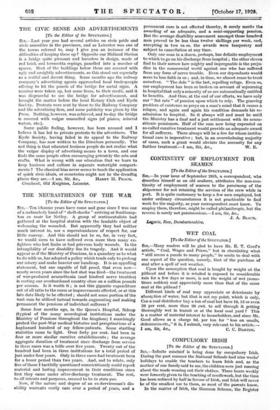THE NEURASTHENICS OF THE WAR
[To the Editor of the SPECTATOR.]
SIR,—Ten irksome years have come and gone since I was one of a melancholy band of " shell-shocks " arriving at Southamp- ton en route for Netley. A group of sentimentalists had gathered at the hospital station with the laudable object of welcoming the wounded. But apparently they had neither much interest in, nor a superabundance of respect for, our little convoy. And this should not be so, for, in very fact, we would seem to have suffered even more then many ex- fighters who lost limbs or had grievous body wounds. In the intangibility of our disability lies its tragedy. And it would appear as if the Ministry of Pensions, in a quandary as to what to do with us, has adopted a policy which tends only to prolong our misery and make heavier our handicap. It is an appalling statement, but one capable of full proof, that even now— nearly seven years since the last shot was fired—the treatment of war-produced neurasthenia (and kindred nerve troubles) is costing our overburdened country close on a million pounds per annum. Is it worth it ; is not this gigantic expenditure out of all ratio to the cures or improvements effected, or at this late date likely to be effected ; should not some portion bf the vast sum be utilised instead towards augmenting and making permanent the pensions of individual sufferers ?
Some four months ago, in the Queen's Hospital, Sidcup (typical of the many neurological institutions under the Ministry of Pensions throughout the kingdom) I searchingly probed the post-War medical histories and peregrinations of a haphazard hundred of my fellow-patients. Some startling statistics came to light. Over forty per cent. had been in four or more similar curative establishments ; the average aggregate duration of treatment since discharge from service in these cases was a trifle over five years. Twenty out of the hundred had been in three institutions for a total period of just under four years. Only in three cases had treatment been for a lesser period than two years. And, sad to relate, only five of those I tactfully questioned conscientiously could report material and lasting improvement in their conditions since first they came under after-dischaxge treatment: The rest, to all intents and purposes, seemed to be in static quo. . Now, if the nature and degree of an ex-Servieeman's dis- ability warrants costly care over a period of years, and a
permanent cure is not effected thereby, it surely merits the awarding of an adequate, and a semi-supporting pension. But the average disability assessment amongst those hundred men proved to be less than twelve shillings per week, and, excepting in two ca es, the awards were temporary and subject to cancellation at any time.
Only one man in a dozen, perhaps, has definite employment to which to go on his discharge from hospital ; the other eleven find to their sorrow how mighty and impregnable is the prejti- dice in the commercial world against one who has suffered from any form of nerve trouble. Even our dependants would seem to lose faith in us ; and, in time, we almost cease to trust ourselves. " The dole " is the last, repelling refuge. Even so, our employment has been so broken on account of sojourning in hospitalthat only a minority of us are automatically entitled to benefits. And thus, at the end of our efforts, we have only our " flat rate " of pension upon which to rely. The gnawing problem of existence so preys on a man's mind that it causes a relapse, and again and again his condition demands his re- admission to hospital. So it always will and must be until the Ministry has a final and a just settlement with its neura- sthenic pensioners. Half of the sum now being expended on so-called curative treatment would provide an adequate award for all sufferers. There always will be a few for whom institu- tional care is imperative ; but, in an overwhelming majority of cases, such a grant would obviate the necessity for any
further treatment.—I am, Sir, &c., W. E.


















































 Previous page
Previous page